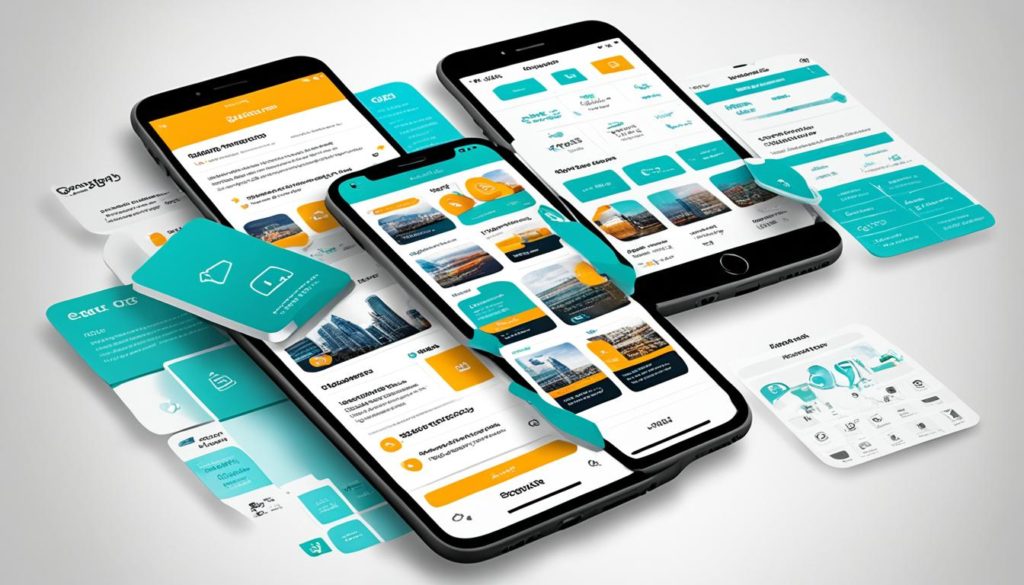
PHP is a big part of web development, used in over 80% of websites. It’s key to use the best PHP library to make your projects better. The right PHP library makes coding easier by providing ready-to-use code. This lets developers work on harder tasks and improves web app functions.
PHP library examples worth mentioning include Symfony Console Component, Guzzle, PHPUnit, and Monolog. These libraries make coding simpler and help apps run well. For more info, check these top 10 PHP libraries. They’re key for creating apps with lots of features.
Take Guzzle, a popular HTTP library in PHP. It lets you send many HTTP requests at once, which is great for apps that do a lot of things at once. Monolog is great for logging messages in an organized way. It works with many logging channels, useful for sorting messages by topic.
Libraries like Carbon are also vital, especially for managing dates and times in PHP. Carbon makes working with dates easier and makes your code neater. With these libraries, we can do less and achieve more, making stronger solutions.
Key Takeaways
- PHP is used by over 80% of global web applications.
- Libraries like Guzzle and Monolog significantly enhance development efficiency and functionality.
- Guzzle supports asynchronous HTTP requests, boosting performance.
- Monolog facilitates organized logging with multiple channels.
- Carbon makes date manipulation in PHP more straightforward and understandable.
- Utilizing top PHP libraries can reduce developer workload and allow focus on complex operations.
Understanding the Importance of PHP Libraries
PHP libraries are crucial in web development. They provide pre-coded functions that make complex tasks simple. With these libraries, developers have access to tools that boost their project’s efficiency and effectiveness.
Definition and Overview
PHP libraries are collections of code for common functions. They can be part of an open-source PHP library project. This gives developers many resources that they can change freely. With clear PHP library documentation, integrating these libraries into projects is easy.
Benefits in Web Development
A well-documented open-source PHP library improves the development process. Some benefits include:
- Boosting productivity by reusing existing code.
- Enhancing application performance with optimized functions.
- Streamlining software maintenance and updates.
These libraries usually offer detailed PHP library documentation. This makes it easy for developers to add specific functions. They’re often available through a simple PHP library download.
Time-Saving Aspects
One big advantage is being able to quickly add complex features. Using an open-source PHP library lets us focus more on the main logic, not starting from scratch. This is made even better with great PHP library documentation. It helps us find and use what we need fast.
How to Select the Right PHP Library
Choosing the right PHP library is crucial for your project’s success. Consider efficiency and reliability. These factors are key to making a smart choice.
Usability and Documentation
Look at the quality of documentation when picking a PHP library example. Good documentation makes it easy to understand a library. It speeds up learning and use. Examples include PHPUnit and Composer tools, praised for their clear guides.
Functionality and Features
Think about what your project needs. Monolog is great for logging and sending data to different places. Websites like PHP libraries and tools list others like Infection for tests and Psalm for analysis. These tools could be just what you need.
Community Support and Updates
A library with a strong community is a plus. Such communities keep libraries up-to-date and solve problems quickly. PHPStan is an example, with support and enhancements from its users.
Compatibility and Performance
The library must work well with your existing systems. Monolog is adaptable and performs well in many settings. Tools like PHP Insights and Deptrac keep your project running smoothly.
Security Considerations
Never overlook security. Use libraries like roave/security-advisories and Local PHP Security Checker to protect your PHP projects. These tools help prevent security issues.
| PHP Library | Functionality | Community Support |
|---|---|---|
| PHPUnit | Testing Framework | Strong |
| Monolog | Logging | Strong |
| Infection | Mutation Testing | Moderate |
| Psalm | Static Analysis | Active |
Stay informed on PHP best practices with sites like PHP the right way and best PHP logging libraries. Keep these tips in mind to find the right PHP library for better efficiency and security.
Popular PHP Libraries Overview
PHP developers have a great selection of libraries that make web development easier. Let’s look at some popular PHP libraries and how they’re used by developers.
Top Libraries Among Developers
Several PHP libraries stand out due to their features and community support. Among them are Symfony, Guzzle, Monolog, and Carbon. Each offers something special:
- Symfony: Offers a wide range of features and is flexible. It’s used with Laravel and Drupal frameworks.
- Guzzle: Perfect for HTTP requests and working with APIs such as AWS, Google Maps, and Twitter.
- Monolog: Makes logging and error tracking easier, supporting multiple channels.
- Carbon: Provides a simple API for date and time manipulation in PHP apps.
Common Use Cases
Different PHP libraries are used for various tasks. Here are some common applications:
- Guzzle is often used for API communications and RESTful services.
- Monolog is great for advanced logging and error tracking in apps.
- Carbon helps with date and time manipulation, making date-based work easy.
- PHPMailer is used for sending emails, supporting attachments and HTML emails.
Integration and Implementation
Adding PHP libraries to projects is easy with Composer and Packagist for managing dependencies. For instance, using Guzzle for APIs or Monolog for logging is simple, thanks to excellent documentation and community help.
Choosing libraries requires attention to usability, function, performance, and security. The top PHP libraries are feature-rich, well-supported, and regularly updated. They are solid choices for any developer.
| Library | Primary Function | Framework Integrations | Key Features |
|---|---|---|---|
| Symfony | Web application framework | Laravel, Drupal | Components, Flexibility |
| Guzzle | HTTP client | Standalone | API interfaces, Request Handling |
| Monolog | Logging | Laravel, Symfony | Multiple channels, Handlers |
| Carbon | Date and time handling | Standalone | Time zones, Formatting |
PHP Library: Guzzle
The Guzzle PHP library is popular for a reason. It makes sending requests and using web services easy. Whether you want to download it or find a tutorial, Guzzle has everything developers need.
Key Features
Guzzle is a favorite choice for many developers. Why? It has many great features, like:
- Customizable request interface
- Asynchronous requests to boost application performance
- Middleware support for request and response manipulation
- Comprehensive documentation
Pros and Cons
| Pros | Cons |
|---|---|
|
|
Example Implementation
Interested in a PHP library tutorial? Here’s how to use Guzzle with an API:
require 'vendor/autoload.php';
use GuzzleHttp\Client;
$client = new Client();
$response = $client->request('GET', 'https://api.example.com/data');
echo $response->getBody();
This example shows how simple it is to use Guzzle for HTTP requests. With Guzzle, you can easily manage complex HTTP interactions. It’s a must-have tool for developers.
PHP Library: Monolog
The Monolog PHP library is a great tool for improving error tracking and application monitoring. It is a key resource for developers wanting to enhance their projects.
Key Features
Monolog comes with strong features, such as:
- Support for multiple logging channels
- Customizable log handlers and formatters
- Integration with various frameworks and tools
These features let developers customize their logging. They provide better control over log generation and storage.
Pros and Cons
Recognizing its pros and cons is useful. It helps developers decide if Monolog is right for their projects. Some important points include:
| Pros | Cons |
|---|---|
| Versatile and customizable | Complex setup for beginners |
| Supports multiple log channels | Needs a good grasp of the documentation |
| Detailed logging with various handlers | Setting it up initially can take time |
Example Implementation
For those new to Monolog, using a tutorial can make setup easier. Let’s look at an example of using Monolog in a project:
use Monolog\Logger;
use Monolog\Handler\StreamHandler;
// Create a log channel
$log = new Logger('name');
$log->pushHandler(new StreamHandler('path/to/your.log', Logger::WARNING));
// Add records to the log
$log->warning('Foo');
$log->error('Bar');
This shows how to set up a logger, add a handler, and log messages. By following the documentation, developers can find more advanced ways to use Monolog.
PHP Library: Carbon
The Carbon PHP library is a great open-source tool for working with dates and times in PHP. It adds to PHP’s own functions, making it easier for developers to deal with time zones and do date calculations. Both new and experienced developers will find it helpful.
Carbon’s big plus is how it lets you write clear code. This means you can easily create dates, change them by adding or subtracting time, and format them. It makes developers’ jobs easier and helps avoid mistakes.
But remember, using Carbon a lot can slow down an app. Yet, its benefits for handling time data outweigh this issue. Carbon helps developers manage time data better, which is key in many projects. It’s a vital tool in PHP development, making coding simpler and more effective.
FAQ
What is a PHP library?
A PHP library is packed with pre-written code, programs, and classes. Developers use them to fix common problems and boost web app functions. They make web development easier and quicker.
What are some examples of popular PHP library?
Popular PHP libraries include Symfony, Guzzle, Monolog, and Carbon. Each has its own use, like Monolog for logging, or Guzzle for HTTP requests. They are known for being flexible and scalable.
How do PHP libraries benefit web development?
PHP libraries come with ready-to-use classes for frequent tasks, boosting web app capabilities. They save time by skipping the need to make features from the ground up. This allows for quick creation of complex functions.
How can I select the best PHP library for my project?
Look at usability, documentation, and if it fits your project needs. Check the community support, and make sure it works with your current tools. Always think about performance and security.
What is Guzzle, and why is it popular?
Guzzle is a loved PHP HTTP client for its easy request sending and web service integration. Its customizable requests and asynchronous abilities help improve app performance.
What are the key features of Monolog?
Monolog is a logging library with features like multiple channels, customizable handlers, and formatters. It’s great for error tracking and monitoring applications.
Why is Carbon widely used in modern web development?
Carbon makes working with dates and times in PHP easy with its clear API. Its user-friendly nature makes it a go-to for developers dealing with date and time in web apps.
Where can I find documentation and tutorials for PHP libraries?
You can find documentation and tutorials for most PHP libraries on their official sites or GitHub. Guzzle’s documentation is on GitHub. Symfony has guides and tutorials on its site.
Future App Studios is an award-winning software development & outsourcing company. Our team of experts is ready to craft the solution your company needs.










